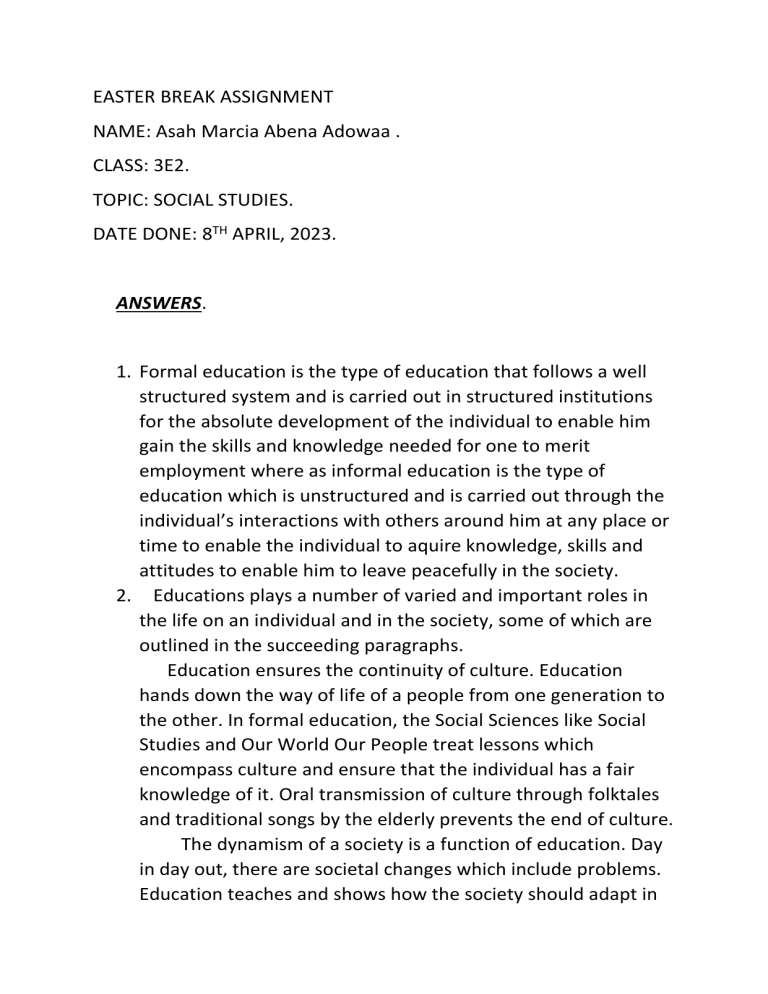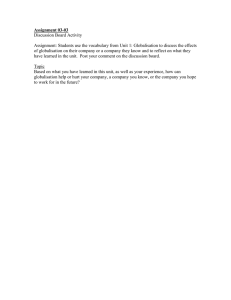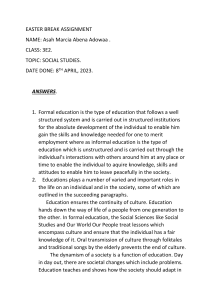
EASTER BREAK ASSIGNMENT NAME: Asah Marcia Abena Adowaa . CLASS: 3E2. TOPIC: SOCIAL STUDIES. DATE DONE: 8TH APRIL, 2023. ANSWERS. 1. Formal education is the type of education that follows a well structured system and is carried out in structured institutions for the absolute development of the individual to enable him gain the skills and knowledge needed for one to merit employment where as informal education is the type of education which is unstructured and is carried out through the individual’s interactions with others around him at any place or time to enable the individual to aquire knowledge, skills and attitudes to enable him to leave peacefully in the society. 2. Educations plays a number of varied and important roles in the life on an individual and in the society, some of which are outlined in the succeeding paragraphs. Education ensures the continuity of culture. Education hands down the way of life of a people from one generation to the other. In formal education, the Social Sciences like Social Studies and Our World Our People treat lessons which encompass culture and ensure that the individual has a fair knowledge of it. Oral transmission of culture through folktales and traditional songs by the elderly prevents the end of culture. The dynamism of a society is a function of education. Day in day out, there are societal changes which include problems. Education teaches and shows how the society should adapt in order to push through these changes. For example; the advent of the Europeans to the Gold Coast came along with western eduction which enlightened the people on the malihuman sacrifice. This made most traditionalists in those days substitute the sacrificing of humans with the sacrificing of animals like goats instead. Education ensures social order. Formal and informal education teach the individual values such tolerance, love and the essence of oneness and skills like diplomacy, which when put into practice ensure peace and order in the society and to prevent and control conflicts, misunderstanding and war. People are educated against social vices like prostition and armed robbery, their ill effects and ways of keeping them at bay. For example : the Akan doctrine of two heads being better than one instills in the individual the importance of unity and team work which are polar opposites of division and war. Also, education provides a means of earning a living. The curricular structure of subjects and courses under formal education are designed to ensure that the individual gets the necessary preparation in terms of the skills, values and training needed to gain employment and remain employed to earn a substantial source of income. Informal education through apprenticeship also hands down vocational skills for example: weaving, carpentry, masonry and street hawking to other indivuals, so that they can provide for themselves and their families. Education is responsible for the moral upbringing of the individual. The teaching of societal tenets, values and norms by elders of the society help mold the individual morally so that he or she does not become a moral or social misfit. Subjects such as Religious and Moral Education and Social Studies also play a significant role in moral training. 3. Education by its nature walks hand-in-hand with societal change. A few positive impacts of education with regard to societal change are as follows. The abolition of outdated socio-cultural practices is a societal change inpacted by education. Enlightenment from education on the dire effects and implications of redundant cultural practices such as female genital mutilation have caused a lot of people to shun their practice. These practices are gradually being wiped out of the society. The presence of education brings about variety on the job market. The skills and knowledge acquired from formal education gives the individual the opportunity to employ him or herself to earn a living if he or she is unable to gain employment from others. Education constantly teaches more efficient ways of solving problems, producing goods and providing services. The introduction of these nouvelle ways creates different jobs on the job market for people to choose from. Education has positively changed the society by bringing about global intergeration.With the introduction of education, Ghana has been able to adopt an official language of English to allow her to partake in foreign affairs. The study of other international languages by diplomats has also promoted Ghana’s transactions and interactions with other nations. For example: His Excellency Nana Addo Dankwah Akuffo’s multilingual abilities make it possible for him to easily interact with other world leaders at international meetings with regard to Ghana’s wellbeing. Societal unification or integration is also a societal change brought about by education. The adoption of the official language of English has promoted interactions and easy communication between the diverse ethnic groups of Ghana. Education has also made it possible for the different ethnic groups to commonly identify themselves with cultural activities that are common to all of them through platforms. For example the annual National Arts Festival in Ghana exhibits the nation’s varying ethnic cultures and unifies them under a common identity. 4. Western education has a lot of impacts on the family system. One of the main effects of Western education on the family system is the loss of respect for family authority. The young and educated individuals in the family tend to disregard their elders and other less educated members who they view as illiterate. Another impact of Western education on the family system is individuals growing up without adequate family history. As a requirement of Western education, the individual spends most of his time with his books and time for socialisation with the extended family is often limited. In the case of boarding school, the distance between the person is widened and the time spent together a family is lessened, thus preventing family history from being passed down and also preventing the person from knowing his kinsmen too. Marriage without family consent is also a reflection of the negative impact of Western education on the family system. Marriage under ordinance, commonly practised by the elite, seeks the presence of witnesses regardless of whether or not they are family. Thus, some educated people get married without the consent of their family which contradicts the traditional ideology of marriage being a union of two families. Also, Western education weakens family ties. Most people after acquiring Western education, move out of their family homes and head to the cities or over seas in search of white coloured jobs. The demanding nature of their work leave little to no time for visiting the family back at home. Even phone calls are limited. This distance weakens and breaks down family relationships. Last but not least, the neglecting of external family members is an effect of Western education on the family system. Western education often promotes the ideology of the nuclear family system more than that of the extended family system. Educated individuals tend to toe these lines and focus solely on taking care of their immediate family, leaving the extended family which is mostly made up of the aged and non working people, to fend for themselves. 5. Globalisation despite its benefits has demerits. Some of these disadvantages of globalisation are discussed in the following paragraphs. Globalisation has lead to the collapse of many local industries. This is so because many individuals have developed an inordinate taste for foreign goods and services at the expense of locally manufactured goods and local services. This has led to the collapse of many local industries as many Ghanaians do not patronise our own products and services. They therefore stop producing goods and providing services in order to prevent incurring more losses and debt. Unemployment is also an effect of globalisation. As aforementioned, the influx of foreign goods unto the market may force local industries to shut down, leaving many people unemployed. Again, globalisation has introduced machines which get work done more efficiently and faster into our society. These machines have taken the place of people, leaving these people without a source of income. For example, the advent of high technology devices such as CCTV cameras displaced some local security people. Globalisation has negatively Impacted national identity. National identity can be defined as the a sense of a nation as a cohesive whole, as represented by distinctive traditions, culture, and language. However globalisation has gradually eroded the distinction between the foreign way of life and our way of life because individuals are letting go of their culture to adopt foreign ones . This makes it difficult for an individual to be identified as belonging to a particular nation. For example, rightly guessing the nationality of a Ghanaian female dressed in jeans and a tee-shirt is almost impossible as opposed to some decades back when seeing one dressed in Kaba and Slit. Another bad effect of globalisation is the rise in crime rate. Due to globalisation, individuals are now exposed to foreign screenplays which show organised crimes like murder and armed robbery. Some individuals take inspiration from this and decide to carry them out. Also, globalisation has made it relatively easy for individuals to lay hands on arms and weapons like guns manufactured in foreign countries due to trade liberalisation. Lastly, globalisation also leads to currency depreciation. Globalisation has provided the opportunity of importing goods from other countries. These goods have unfair amount of taxes on them and as a result, individuals end up paying more for goods than the price they cost at their country of manufacture. Thus, the individual would need more of his currency in order to increase his purchasing power. 6. Bilateral cooperation refers to a political, social, cultural, educational or technical agreement between two countries in which both countries gain whereas multilateral cooperation is a political, social, cultural, educational, or technical agreement between more than two countries in which they all benefit something. 7. Cooperation are very advantageous to the nations involved in it. The following are some of the benefits of cooperation. Cooperation promotes socio-cultural development in countries. Countries receive assistance from foreign institutions like the American Field Service and Voluntary Service Overseas who provide rural communities with social amenities like schools and hospitals which would ensure better leaving conditions and improve living standards. Institutions like Child Rights International and Amnesty International also ensure that human rights are protected so as to provide the needed environment for individuals to realise their full potentials. Cooperation also contributes to the development in a nation’s educational sector. Scholarship opportunities to study and sharpen their skills in other countries and exchange programmes diversify the educational system and encourage academic excellence in the sector. Educational materials such as textbooks, computers and lab equipment are also provided by some countries in a cooperation to others. For instance, Ghana receives educational materials from UNICEF and UNESCO. Military assistance is also a benefit derived from cooperation. In some cooperation, countries experiencing war and instability are given assistance in the form of deployed military troops. Countries with relatively powerful military bodies offer training to the military of the other countries. Another benefit of cooperation is the access to financial assistance. Countries in cooperation can readily receive monetary assistance in times of crisis under certain terms and conditions enjoyed only by members of the Cooperation. For example, many countries receive assistance form the International Monetary Fund to handle developmental projects and to facilitate economic restructuring. Improvement in the health sector is also an advantage of cooperation. The cooperation allows more experienced countries to assist other less experienced countries in terms of complicated and delicate surgeries. Some organisations provide countries with materials and equipment like drugs and vaccines needed to battle with diseases and viruses. For example, in 2020 during the Co-vid 19 pandemic, the World Health Organisation provided many underdeveloped countries with medical assistance in the form of vaccines and protective clothing. 8. The Economic Community of West African States (ECOWAS) is an international organisation comprising of 16 member countries in West Africa. It is of a lot of merits to its members. A handful of these benefits are highlighted below. The ECOWAS promotes peace in its members states. Through its formation of ECOWAS Monitoring Group (ECOMOG) which is made up of the integration of military resources of its member states, the ECOWAS has promoted peace keeping. The end to Liberia’s civil war is a reflection of ECOMOG’s effort. The ECOWAS also promotes free movement of people of its member states. It ensures that citizens of the community can travel to a member country with only a valid passport and without a visa. Moving on, the ECOWAS serves as a powerful and common front for its members. This is so because, through the ECOWAS, member countries can project a common voice and pursue their ambitions in international conferences, much better than they could have done individually. The ECOWAS again ensures economic cooperation between it’s member countries. The coming together of the member countries allow goods to move freely to any part of West Africa with little to no tedious processes. This provides a larger market for goods produced as more people would be patronising. Finally, the ECOWAS attracts foreign investment for its member sates. The presence of a larger economic market, foreign investors would feel confident and will invest more capital as the probability of yielding more profit is assured.



